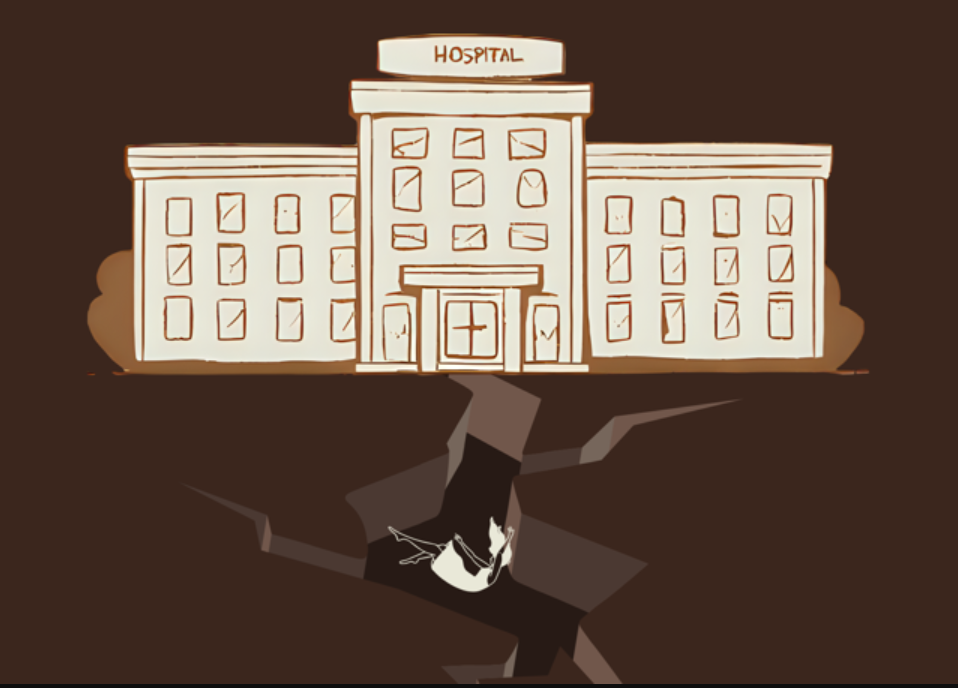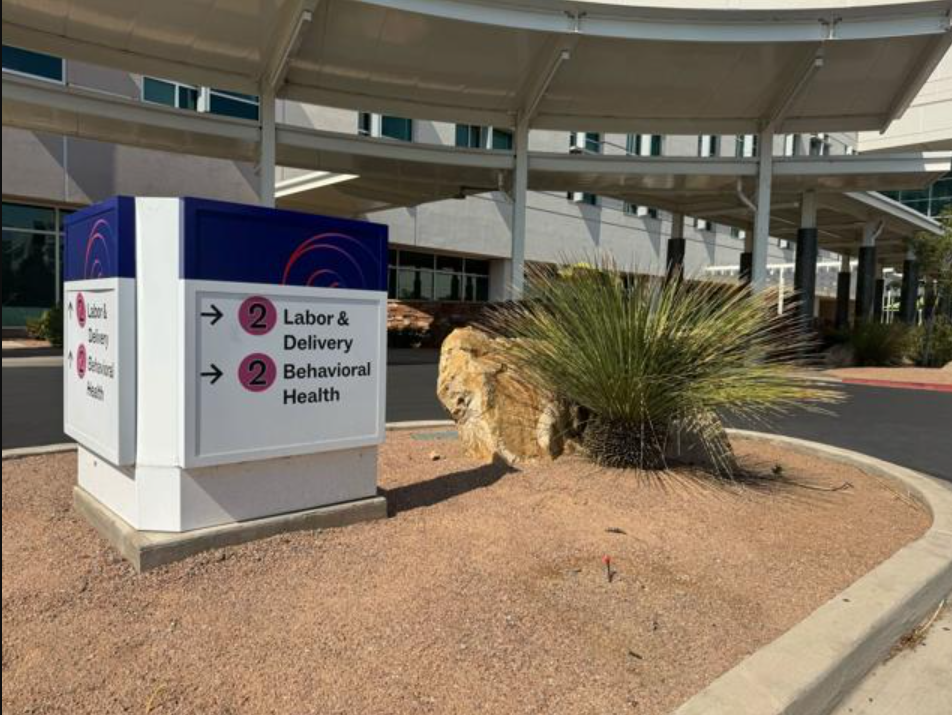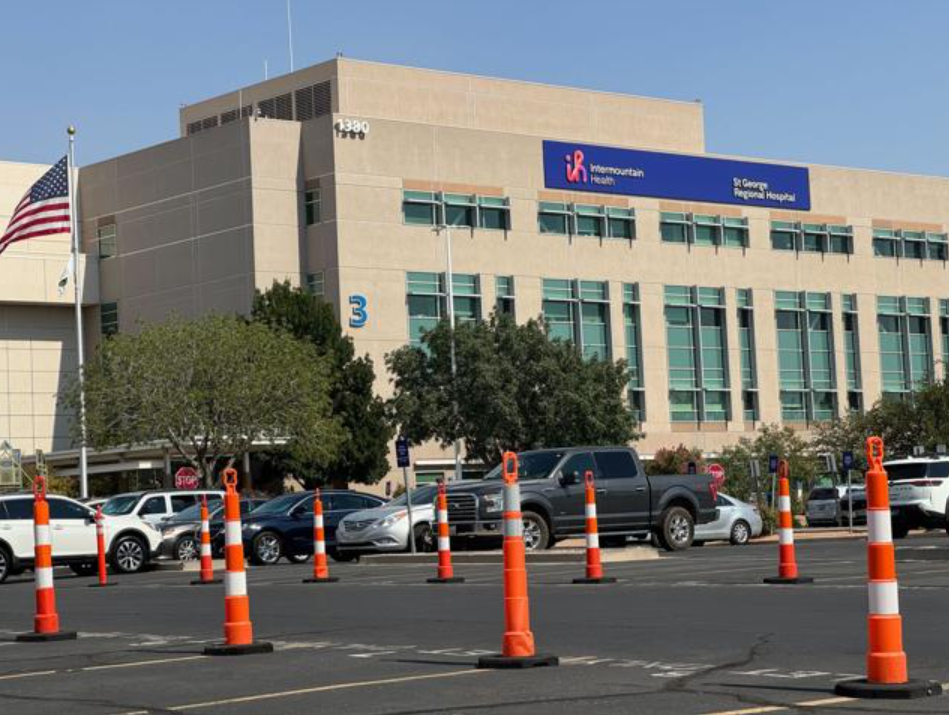
An arrow points the way to the behavioral health unit at St. George Regional Hospital, St. George, Utah, July 14, 2025. A woman was allegedly sexually assaulted at the unit, and prosecutors declined to press charges on the suspect.
The following story was reported by The Utah Investigative Journalism Project in partnership with St. George News.
Kristy Woodhouse says raising her developmentally disabled daughter “Elizabeth” has been a wonderful challenge.
“She’s so sweet, if you give her money to go buy something at the store, she’s buying something for you instead,” Woodhouse said.
Though developmentally disabled, she’s functioning and aware enough to crave a normal life. While she’s in her early 20s, Woodhouse says “mentally she’s 14.”
She obsesses over boys, makeup and getting her hair done.
But she’s also aware enough to know that she may never have the life that she wants.
“God doesn’t make mistakes, he wants you to be this way,” her mother has told her.
Unfortunately, Woodhouse says Elizabeth is vulnerable “because she wants a relationship like everybody else.”
The Utah Investigative Journalism Project is not identifying the young woman by her real name for the sake of protecting her privacy.

In 2023, Elizabeth was sent to the behavioral health unit at St. George Regional Hospital. Before she landed at the hospital, she was in a 24-hour treatment center in Southern Utah where she became depressed over the recent death of her grandfather and tried to overdose on her medication.
On Feb. 12, 2023, however, something happened to Elizabeth at the hospital she could not understand. She had developed a crush on another patient in the unit, a 28-year-old man who was homeless at the time.
What began as an innocent flirtation ended with the man leading Elizabeth to his room, where he dragged her into the bathroom. He then knocked her head against a wall and when she tried to scream, he covered her mouth, according to police reports. The Utah Investigative Journalism Project is not identifying the suspect since he was never charged by the authorities.
How could this happen in a secure facility?
It was a question Woodhouse never could get answered. Nor could she find any justice. The hospital told her that, unfortunately, their cameras were not working and couldn’t provide evidence to police.
The police were anxious to close the case — too anxious, said Woodhouse, adding that they tried to wrap up the investigation in just two days until she protested.
She couldn’t fathom why anyone would think Elizabeth could consent to sexual contact as a developmentally disabled person in a behavioral health unit at a hospital. But prosecutors felt they had insufficient evidence of assault.

When a crime is alleged to have been committed against a vulnerable patient in a hospital, it triggers an avalanche of investigations from different agencies trying to discover how it could happen.
That’s how the system is supposed to work. In this case, the police could not convince prosecutors to file charges. The Utah Department of Health and Human Services was aware of the incident but did not conduct an inspection of the hospital afterward to make sure its cameras were working and that other appropriate safeguards were in place.
The hospital told Woodhouse that it would conduct its own investigation to correct any errors, but when she asked about their findings, staff instead referred her to the police.
“A hospital should be the safest place for anyone,” Woodhouse says.
The walls of her modest home in Price are adorned with family pictures and framed pieces of her art — intricate depictions of owls, elk and other animals painted on large maple leaves.
“My canvases fall from the sky,” her website states.
But that all came to a halt after the assault on her daughter.
“I fought so hard, I put my life completely on hold. I stopped painting — everything — just to try to take care of her and get through it all,” she says.
‘The gentleman involved was shocked’
The Utah Investigative Journalism Project reinterviewed some of the witnesses in the case who had previously spoken with police. They described injuries Elizabeth had that did not show up in the official report. One former patient also said staff members were lax in supervising the patients in the behavioral health unit.
Elizabeth had been admitted to the behavioral health unit at St. George Regional Hospital on Feb. 8, 2023. She left five days later, when the doctor’s discharge report said she was “in much improved condition. She attended individual group therapy and was able to develop a new perspective and wanting to live.”
But near the end of the doctor’s report a notation discusses her being prescribed an anti-HIV medication because of “possible sexual assault.” The doctor then wrote that she “denied having any intercourse during this alleged assault and denied being forced.”
But that’s not what she told the police.
On Feb. 12, 2023, officer Vinton Lovell reported that Elizabeth had been sexually assaulted at the hospital. Another patient at the time claimed to have walked in on Elizabeth and the suspected abuser in his room. This witness said “it appeared to her that the interaction was consensual.”

Lovell interviewed Elizabeth, the suspect and the witness — and that was it.
Approximately a week later, Elizabeth’s mother called police and was told the case was closed.
“From the beginning, everyone in the police force has not taken her disability seriously,” Woodhouse said.
According to a report from the Utah Department of Health and Human Services, a police sergeant was dismissive of the idea that an assault had taken place.
The sergeant told the Health and Human Services investigator that, based on officer Lovell’s report, “The gentleman involved was shocked by the accusations as he reported that she was into the act and at no time did he force her.” The sergeant also told the investigator that, “There was trauma found but it is not clear if that is just due to sex or for other reasons.”
Woodhouse was outraged.
“It was closed in a couple days, and they reopened it because I called and threw a fit,” she said.
The second investigation
A new detective came onto the case, and Elizabeth was taken to the Children’s Justice Center for a forensic interview. Detective Maryann Wangsgard noted that Elizabeth had experienced sexual trauma, as well as bruising on her “left forearm and right shin.”
The forensic interview happened almost two weeks after the alleged assault. Elizabeth did her best to tell her side of the story.
While she struggled to tell her story, she did describe injuries consistent with accounts recorded the day of the assault, according to the report.
Elizabeth said the suspect “dragged her into his room and then bathroom where he forced himself on her. She reported that he hit her head against the concrete where she became disoriented and he continued to touch her.” Elizabeth also reported being penetrated by the suspect’s penis.
Wangsgard’s report included interviews with multiple patients and staff members. One male staffer reported spotting Elizabeth and the suspect when they left the room and they were “both smiling and pretty happy” until the staffer asked what they were doing.
A nurse that spotted Elizabeth after the incident, however, described her as “shocked” as she exited the room. The nurse took her into a private room and Elizabeth told her and other patients that she had been assaulted.

Wangsgard also interviewed the suspect, who was quick to say everything was consensual. He said they had been flirting that day and snuck away from the group to go back to his room. The suspect told the officer “he could tell she hadn’t had sex before.” He denied there was any penetration, though he did say he touched her groin. He also said that when another patient walked in on them, they laughed it off and left.
In his interview with Wangsgard, the suspect also said that when they left the room “I told her I loved her and she said I love you too and we walked out.”
But he then described the encounter as “awkward.” Still, he told Wangsgard that he liked Elizabeth and that he had written her name with a marker on his arm so he could look her up on social media when he got out of the hospital. When asked about her hitting her head, he acknowledged “that could have happened.”
The new investigation lasted until June 8, 2024, when the detective met with Washington County prosecutors to discuss the case. The prosecutors decided no criminal charges would be filed against the suspect “due to insufficient evidence, referencing his knowledge of (Elizabeth’s) mental capacity.”
‘Anyone in their right mind could see she’s not all there’
Sapphire Gower was a friend of Elizabeth’s in the behavioral health unit. She said it was a strange and incredible experience to bond with people in that environment.
“It was really interesting meeting people who shared the same struggle,” Gower said. “People you just about never had a chance to meet because they almost died.”
Audrie Okobia, another patient who was in the behavioral unit with Elizabeth, agrees with the sentiment.
“You learn everyone’s deep trauma right off the bat, so it’s very easy to get to know people,” Okobia said.

Gower recalled Elizabeth talking about having a crush on a guy not at the hospital. She says Elizabeth did not want to have sex with the suspect, and that it was the suspect who was hitting on Elizabeth. Gower said she did not trust the suspect.
“He bragged about being a criminal and beating up people in jail, like that was somehow cool,” Gower said.
She recalled walking with Elizabeth earlier the day of the assault before losing touch with her.
“Next time I see (Elizabeth), she is being strolled out in a wheelchair. She was bleeding badly,” Gower said. She recalled trying to calm Elizabeth and said that a nurse gave her friend a bandage and a robe because of the bleeding in her groin.
“She said she was hurt and scared over and over again,” she said. “You could tell that was not made up.”
This account of her bleeding, confirmed by Okobia, never made it into the police report and was not noted by the first officer who responded to the complaint.
The St. George Police Department did not respond to questions about the investigation.
Okobia also remembers Elizabeth complaining that her head hurt.
“She was very distraught, crying and shaking,” Okobia said.
Okobia later confronted the suspect in his room.
“I said, ‘Anyone in their right mind can see she’s not all there,’” Okobia recounted.
While the prosecutors felt there wasn’t evidence to show the suspect would know she was impaired, Okobia said everyone knew it and everyone saw it.
“He was smart enough to know she was young and under some kind of influence,” Okobia said.
“She seemed like she was so high,” Okobia said. “You could just see it on her face, like she was on some kind of downers.” It affected her movement and speech. Her friends joked about her being on the “good drugs.”
“Her speech was just slurred and delayed,” Okobia said. And the suspect knew it, too, she added.
According to her hospital admission report, this may just be how Elizabeth talks normally as she was noted as having delayed speech problems because of her disability.
This subject came up during the detective’s interview with the suspect, when she asked if he noticed anything unusual about Elizabeth.
“So like the way me and you are talking, I don’t think me and her were able to have a conversation like that,” the suspect said. When the detective pressed him on why that was, he said that it was because Elizabeth was “socially awkward.”
The Washington County Attorney’s office was asked if it was aware of Elizabeth’s visible state of impairment at the time of the assault and if that would have affected the decision not to file charges. The office did not respond.
Okobia noted something else that did not appear in the police report. Since many patients in the unit were at risk of suicide, staff were supposed to check on them every 15 minutes.
“The staff weren’t checking us every 15 minutes. They were watching the Super Bowl with us,” Okobia said of Feb. 12, 2023, the day the assault was reported.
On hold
While Adult Protective Services investigated the assault and determined that Elizabeth was a “vulnerable adult due to mental impairments,” the allegation of sexual abuse was closed because of “conflicting evidence.”
The St. George Regional Hospital was not inspected by state officials after the incident, even though it acknowledged its cameras were not working in the behavioral health unit.

The Department of Health and Human Services said in a statement that Adult Protective Services would inform a separate department, the Division of Licensing and Background Checks, about a possible inspection — but only if Adult Protective Services reported “supported findings” of the sexual abuse, which it didn’t.
The Adult Protective Services investigator only interviewed the suspect, Elizabeth and a St. George police sergeant, according to a report Woodhouse shared with The Utah Investigative Journalism Project.
The Utah Investigative Journalism Project sent Intermountain Health multiple questions about the reported assault at its St. George facility and the hospital provided a written statement.
“We take all allegations of this nature seriously. While we are unable to comment on individual patient health information, matters like the one you are describing would be turned over to law enforcement and Intermountain would cooperate fully with the investigation led by law enforcement. The safety and well-being of our patients is our highest priority,” the institution said in a statement.
For Woodhouse, getting answers from the hospital or Health and Human Services was a slog.
The hospital initially referred her to the police report. After reaching out directly to medical records, she was able to get discharge documents for her daughter. But the hospital would not release further safety and incident reports. The hospital told Woodhouse in 2023 that they would get to the bottom of the matter.
But it wasn’t until July 2025 — a week after The Utah Investigative Journalism Project sent questions to Intermountain Health — that the hospital finally reached out to Woodhouse to answer her questions.
So far, she has not been happy with police, prosecutors, the hospital or the state.
“Everybody just dropped everything,” Woodhouse said.
If you support the work we do and believe in the power of a free and independent press, please consider making a tax-deductible donation to The Utah Investigative Journalism Project by visiting utahinvestigative.org/donate.



Leave a Reply